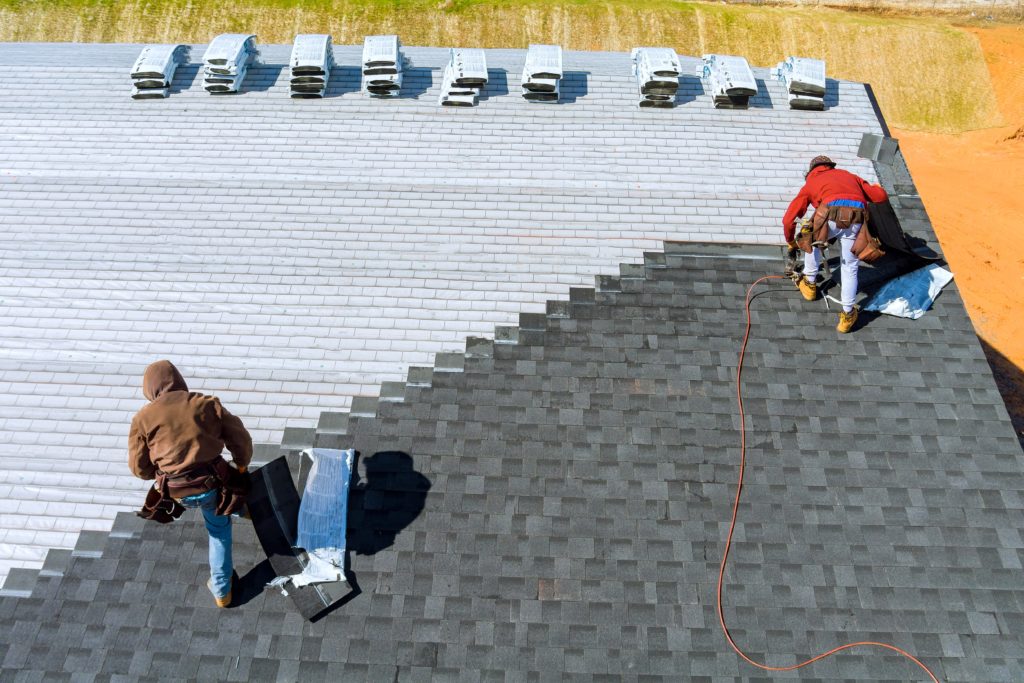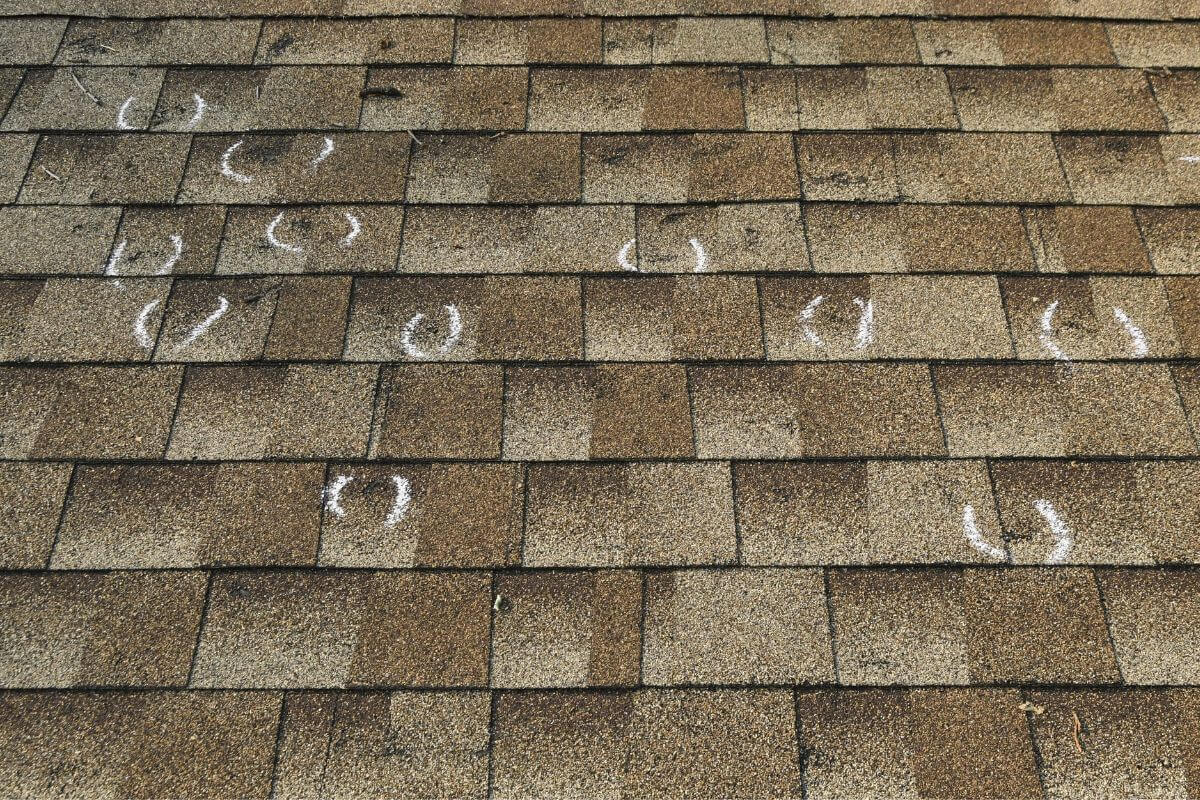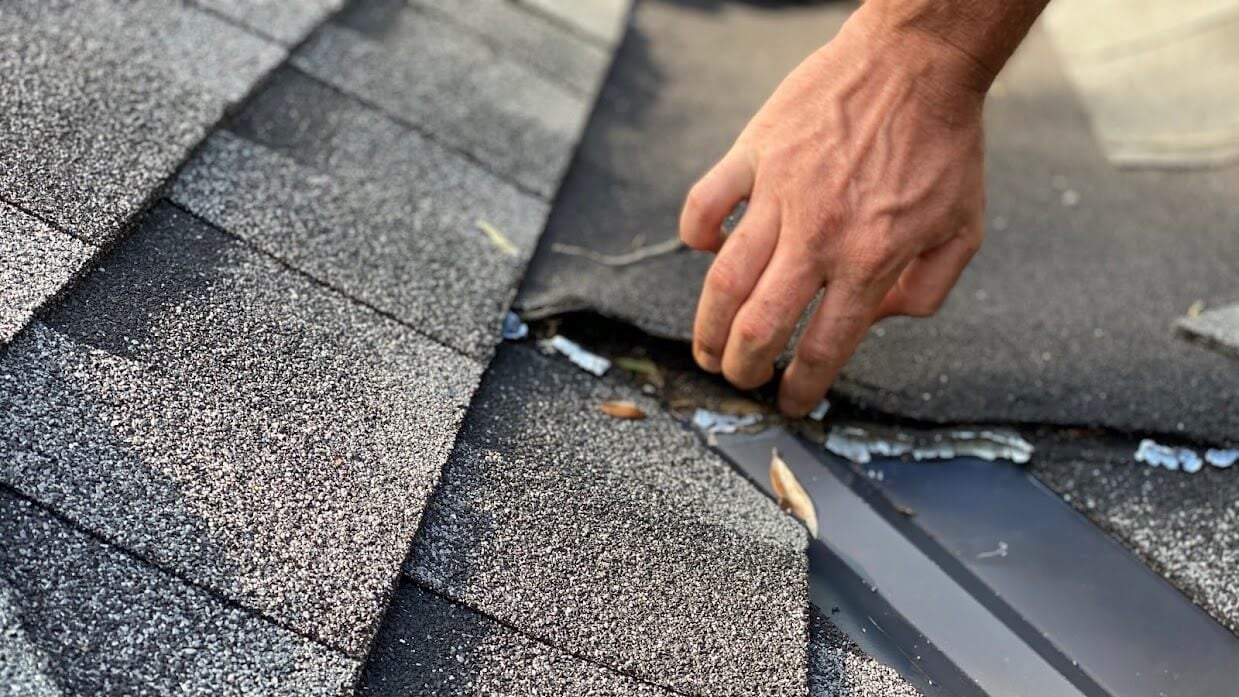Do I contact insurance first or contact a roofing company? This choice affects how smoothly your claim process will go. We’ll help you understand the benefits of each approach.
Key Takeaways
- Act swiftly after roof damage, starting by ensuring safety and preventing further damage with temporary measures.
- Contact your insurance company first to understand your policy and ensure a smooth claims process, but consider consulting a roofing contractor for an accurate damage assessment.
- Choose a trustworthy roofing contractor like Rhino Roofing to assist with the insurance claim process, ensuring proper documentation and communication with adjusters for optimal coverage.
Understanding Roof Insurance Claims
Roof damage can be overwhelming, but swift action is necessary. First, assess the situation and move to a secure location if necessary to ensure your safety. Once safe, focus on preventing further damage. Using tarps or other temporary measures to protect your home’s interior from roofing and storm damage can prevent additional headaches.
Promptly filing a claim with your insurance company is critical. Provide detailed information about the damage and its cause. Thorough documentation is key—take clear photographs and keep records of everything. This will be invaluable during the claims process, ensuring a smooth outcome.

Once you file your claim, an insurance adjuster will inspect the damage to evaluate its extent and determine necessary repairs. The adjuster’s assessment significantly influences your claim’s outcome. Being present during their inspection, along with a trusted roofing contractor, helps make sure all damage is accurately reported.
Finally, understand your insurance policy’s coverage and exclusions before filing a claim. Knowing what your insurance policy covers, including deductibles and limitations, helps you navigate the claims process more effectively, preventing surprises and ensuring maximum coverage.
Should You Contact Your Insurance Company or Roofing Contractor First?
Upon discovering roof damage, a key decision arises: Should you contact your insurance company or reach out to a roofing contractor? The order can impact the efficiency of the claims process. Each option has its benefits, and if you need assistance, you may want to call a roofer, depending on your circumstances and the extent of the damage.
Contacting your insurance company first provides guidance through the claims process and ensures policy compliance. Conversely, reaching out to a roofing contractor first offers an accurate damage assessment and supports your insurance claim.
The following sections delve into the benefits of each approach.
Benefits of Contacting Your Insurance Company First
A primary benefit of contacting your insurance company first is the guidance they offer throughout the claims process. They help you understand your coverage, deductible, and exclusions, preventing costly mistakes. This initial contact ensures you are aware of the necessary documentation and steps to take, smoothing the process.
Understanding your insurance policy specifics, including covered damage types, is crucial. By contacting the insurance company first, you avoid unauthorized repairs and complications from improper procedures. This helps you determine accurate coverage and make sure all necessary repairs are authorized.
Additionally, contacting the insurance company helps avoid pitfalls and ensures efficient claim processing. They offer valuable advice on documenting damage and avoiding mistakes that could impact your settlement. This proactive approach can save time and money.
Advantages of Reaching Out to a Roofing Contractor First
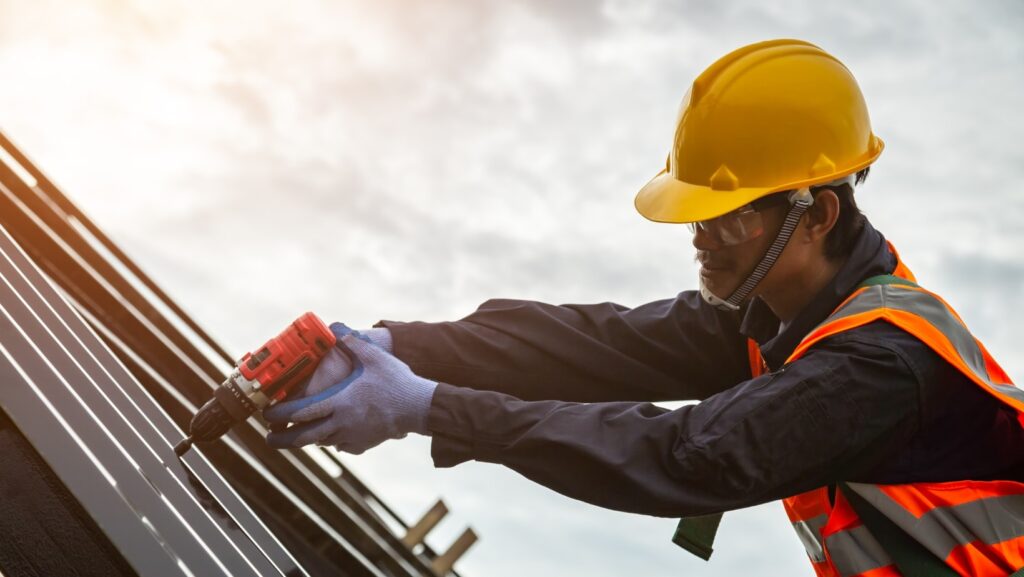
Roofing contractors offer an unbiased assessment of your roof’s condition before you file an insurance claim. They understand the required scope of work and can determine necessary repairs and the extent of damage after a thorough inspection. This accurate assessment ensures that all damage is properly documented and addressed.
Experienced roofing contractors also negotiate with insurance adjusters to get accurate damage documentation during inspections. They communicate effectively with adjusters to clarify all the necessary work, facilitating a smoother claims process. It also allows them to obtain coverage for all required repairs. A professional roofing contractor can provide valuable support throughout this process, similar to what roofing companies offer.
Choosing a trustworthy, experienced contractor minimizes future claims issues. They can recommend preventive measures like regular inspections and maintenance to avoid future damage. Maintain communication with your contractor so that they can address questions and provide future repair cost estimates.
How Rhino Roofing Supports Your Insurance Claim Process
Rhino Roofing supports homeowners through the insurance claims process by thoroughly documenting roof damage, which is essential for a successful claim. With Haag-certified inspectors, Rhino Roofing ensures detailed assessments that meet insurance evaluation standards.
The company collaborates directly with a homeowner’s insurance company and insurance adjusters to streamline the claims process. They facilitate direct communication between homeowners and adjusters, ensuring all necessary damage is documented and addressed while also coordinating with insurance companies.
Rhino Roofing’s expertise in insurance restoration offers clarity and support throughout the claims process, simplifying navigation for homeowners.
The Role of Insurance Adjusters in Assessing Roof Damage
Insurance adjusters play a critical role in assessing roof damage. They evaluate the roof’s integrity by examining the materials used, previous repairs, and prior maintenance records.
Having a trusted roofing contractor present during the insurance adjuster’s inspection can improve the claim process. A contractor ensures all damage is accurately reported, potentially leading to a more favorable outcome and ensuring the insurance company covers all necessary repairs.
Factors to Consider Before Filing a Roof Insurance Claim
Before you file a roof insurance claim, thoroughly assess and document the damage. Clear photographs and videos provide valuable evidence. Roofing contractors can identify the full extent of the damage, including less visible areas.
Understanding whether your roof is covered under Actual Cash Value or Replacement Cost Value is crucial when filing a claim. This knowledge affects your decision and claim outcome. If repairs are less than your deductible, filing a claim may not be beneficial. Weigh repair costs against your deductible to make an informed decision.
Homeowners’ insurance often covers temporary repairs, but act quickly to mitigate further damage. Document initial damage and temporary repairs with photos and receipts, as required by insurance policies. Consult your policy to understand your damage mitigation obligations after an incident.
A reliable roofing contractor can provide an accurate repair estimate. Their expertise helps determine whether it’s worth filing a claim or managing repairs without involving your insurance. This approach can save time and potential premium increases.
Temporary Repairs and Preventing Further Damage
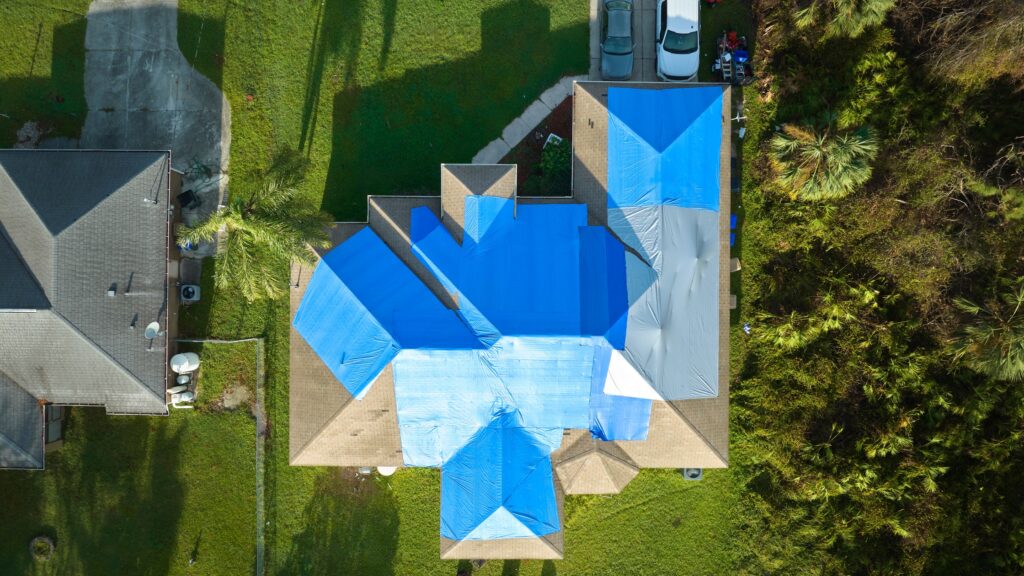
Temporary repairs protect your home from additional damage after an incident. Measures like roof tarping, boarding up broken windows, and quick water extraction prevent further water damage, buying time for professional assessment and permanent repairs.
Common temporary repairs covered by homeowners’ insurance include roof tarping and boarding up broken windows. Acting quickly helps prevent further damage and supports your claim by showing immediate mitigation steps.
Avoiding Common Pitfalls in the Roof Insurance Claim Process
Homeowners often face claim denials if they start repairs before receiving insurance approval. Wait for the insurance company’s green light before proceeding with permanent repairs. Additionally, normal wear and tear is generally not covered under roof insurance claims, so identifying the cause of the damage is necessary.
Clear documentation and honest repair recommendations ensure a smooth claims process and a straightforward repair process. Avoid requesting a complete roof replacement unless warranted, as insurers may reject unnecessary claims.
Review the reasons for the claim denial and consult a professional to help appeal the decision.
Rhino Roofing’s Lifetime Installation Guarantee
Rhino Roofing offers a lifetime installation guarantee, ensuring any installation errors are promptly corrected. This guarantee applies to qualified roof systems and highlights our commitment to quality and customer satisfaction. Homeowners can feel confident in the durability and reliability of our roofing solutions, knowing any issues will be addressed at no extra cost.
Our guarantee aims for 100% satisfaction in all our services. This commitment to quality and customer care sets us apart as a reputable roofing contractor and company that homeowners can trust.
Financing Options for Roof Repairs and Replacements
Rhino Roofing offers flexible financing plans to accommodate different budgets and needs. Homeowners can manage roofing costs effectively with payment options that allow for affordable monthly installments. These financing options help homeowners avoid using home equity lines or second mortgages, making the process more accessible.
Quick financing proposals from Rhino Roofing help secure project funding. Homeowners can request financing amounts from $1,000 to $100,000 through our partnership with Enhancify. Pre-qualification for financing takes only 90 seconds and does not affect the homeowner’s credit score, making it a convenient option.
Summary
Navigating the process of handling roof damage can be daunting, but making informed decisions can lead to a smooth and successful outcome. Whether you contact your insurance company or a roofing contractor first, understanding the benefits of each approach is helpful. Rhino Roofing offers comprehensive support throughout the insurance claim process, ensuring that all necessary repairs are covered and completed to the highest standards.
With our lifetime installation guarantee and flexible financing options, homeowners can feel confident and secure in our roofing solutions.
Frequently Asked Questions
Should I contact my insurance company or a roofing contractor first after discovering roof damage?
Contact your insurance company first to understand your policy and get guidance on the next steps. This will empower you to make informed decisions when you contact a roofing contractor for an accurate assessment of the damage.
What are the benefits of contacting my insurance company first?
Your insurance company can guide you through the claims process. They will clarify your coverage details and authorize required repairs, making everything smoother. Take this proactive step for a hassle-free experience!
How can a roofing contractor help with my insurance claim?
A roofing contractor can significantly boost your insurance claim by offering a detailed damage assessment, aiding negotiations with the insurance adjuster, and ensuring thorough documentation. With our expertise, you can navigate the process more confidently and secure the coverage you deserve!
What should I consider before filing a roof insurance claim?
Consider documenting the damage and getting a repair estimate to see if it exceeds your deductible, as it may not be worth filing a claim otherwise. Understanding your policy’s coverage will empower you to make the best decision for your situation!
How does Rhino Roofing support the insurance claim process?
Rhino Roofing simplifies the insurance claim process by meticulously documenting damage, working directly with insurance adjusters, and ensuring smooth communication. We will guide you through every step, making it easier to get the support you need!
